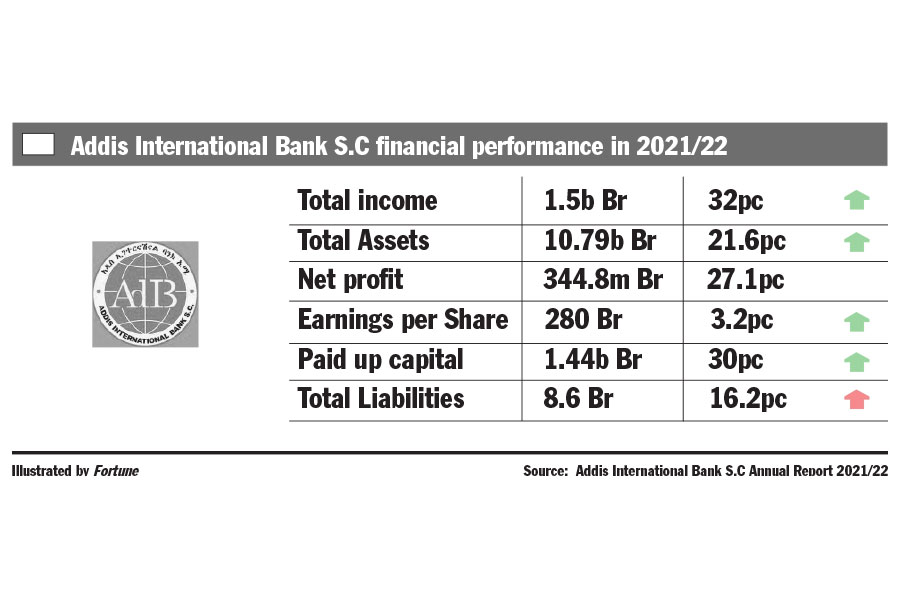
Radar | Jun 26,2021
May 6 , 2023
By AKSAH ITALO ( FORTUNE STAFF WRITER )
Financial technology firms partnered with the central bank to design and execute a regulatory framework for moveable collateral and non-collateral loans that address Micro, Small and Medium Enterprises (MSMEs).
Access to finance significantly impedes MSME’s expansion, although they represent nearly 85pc of businesses.
Less than 15pc of Enterprises have had access to finance in the past few decades through stiffer credit terms in the form of higher interest rates, shortened maturities and increased requests for collateral financing.
The absence of digital and credit infrastructure, limited data, an imbalance of risks and costs, insecure transactions and collateral registries and a lack of insolvency procedures are cited as primary reasons for financial institutions' reluctance to support MSMEs. Nevertheless, they continue to be the most common source of external finance.
A forum focused on data-driven digital lending was organised last week to overcome barriers to financial inclusion.
The National Bank of Ethiopia (NBE) joined International Financial Corporation (IFC), Financial Sector Deepening-Ethiopia (FSD), Kifiya Financial Technology and the Mastercard Foundation in the discussion.
The Vice Governor of the central bank, Solomon Desta, addressed that access to finance is concentrated in a few mediums where the Bank has recognized improving policy is crucial.
"We’re actively working on the infrastructure to facilitate this initiative," said Solomon.
Last year, the central bank facilitated 3.6 billion Br in non-collateral loans to MSMEs, a fourfold increase from the previous year. Solomon said the authorities aim to extend financial access to 70pc of the population by 2025.
Experts at the IFC urged banks to broaden their financial services to traditionally underserved sectors, such as farmers.
"There’s a broad gap in financial inclusion of smallholder farmers," said Paula Leynes, upstream and advisory services at IFC. Opening up digital financial services to smallholder farmers and rural MSMEs presents a sizeable market opportunity that must be prioritized.
Agriculture is the backbone of Ethiopia’s economy, contributing over 35pc of the GDP. It accounts for over 85pc of the labour force, earning over 90pc of the foreign exchange revenue.
According to Aliou Maiga, regional director at IFC, digitising payments along value chains can provide additional data points enabling banks to build services that may reduce the risk of crediting these unserved sectors.
Cooperative Bank of Oromia (COOP) ushered in the first digital non-collateral lending platform eight months ago, dubbed Michu, in partnership with Kifiya Financial Technology.
The Bank was able to disperse 946 million Br loans to farmers through Cooperative Unions and MSMEs, reaching more than 100,000 customers.
"The default risk was less than 10pc," said Derbie Assefa, president of the Bank. "The risk is overrated by most financial institutions."
The Bank's non-performing loans (NPL) ratio stood at two percent, lower by two percentage points than the average for the top industry performers. Provision for impairment of loans and other assets soared by 177pc to 631.63 million Br, revealing that substantial loans and advances increased.
Lack of financial literacy among borrowers and lack of a proper credit scoring system were some of the barriers faced by the Bank, according to Derbie.
The second version of Michu is underway and will be launched in a few weeks. According to the Bank president, the plan is to portion prospective borrowers into segments of nano, nano plus, micro, small and medium enterprises.
"The application requirement and the amount of loan dispersed will differ," he told Fortune.
Established in 2010, Kifiya Financial Technology has been developing an AI-based credit scoring and digital lending platform. The application with the moniker Qena is expected to enable financial institutions to provide credit to MSMEs.
Enat, Buna and Nib International banks have struck a deal with the company, according to Lewam Assefa, a marketing director of Qena.
A representative from a foreign bank was also present on the panel.
Hartnell Ndungi, chief data officer at Absa Bank in Kenya, stressed the importance of giving access to MSMEs through digital lending.
“Banks should be a credit economy,” he said.
Hartnell leads Absa's Data Science and Governance, Business Intelligence and Analytics. He was previously a senior data consultant providing analytic services to governments, banks and insurance firms.
He deemed accessing new customers and introducing new products crucial while risk mitigation plans, strengthening credit registries and allocating the development banking credit effectively.
"Banks have to introduce innovative ideas," he said.
He observes most financial sectors battle between giving access to credit and payment. But financial inclusion allows banks to increase in size and improve their productivity.
Solomon Damtew, director of the payment and settlement systems directorate at the central bank, said mobile money usage, which is an essential framework for financial inclusion and services, is expanding, providing easier access to lenders and borrowers.
According to Solomon, there should be feasible digital infrastructure for credit scoring and keeping the historical creditworthiness of a borrower for banks to build trust.
The central bank, in partnership with data scientists, has started to build a road map to create a digital infrastructure for default risk calculations and credit scoring.
IFC has created a Partial Credit Guarantee (PCG) scheme that shares the risks banks face while providing collateral-free loans to pay principal interest up to a pre-determined amount.
Kinfemichael Yibkaw, an agri-finance expert at IFC, said the Corporation will mitigate up to half of the losses when financial institutions have exhausted resources to pay back defaults in order to improve the non-collateralized financing to MSMEs and small-holder farmers.
"We're holding round-table discussions with 10 commercial banks," said KinfeMichael.
According to him, the perception that financial institutions’ default risks would be heightened is far from the truth.
"The default risk is usually less than 10pc," he told Fortune.
PUBLISHED ON
May 06,2023 [ VOL
24 , NO
1201]

Radar | Jun 26,2021

Fortune News | Nov 13,2021

Commentaries | Jul 17,2022

Fortune News | Oct 08,2022

Commentaries | Nov 19,2022

Agenda | Oct 13,2024

Commentaries | May 14,2022

Radar | Aug 05,2023

News Analysis | Apr 22,2023

Radar | Feb 04,2023

Dec 22 , 2024 . By TIZITA SHEWAFERAW
Charged with transforming colossal state-owned enterprises into modern and competitiv...

Aug 18 , 2024 . By AKSAH ITALO
Although predictable Yonas Zerihun's job in the ride-hailing service is not immune to...

Jul 28 , 2024 . By TIZITA SHEWAFERAW
Unhabitual, perhaps too many, Samuel Gebreyohannes, 38, used to occasionally enjoy a couple of beers at breakfast. However, he recently swit...

Jul 13 , 2024 . By AKSAH ITALO
Investors who rely on tractors, trucks, and field vehicles for commuting, transporting commodities, and f...

Jul 12 , 2025
Political leaders and their policy advisors often promise great leaps forward, yet th...

Jul 5 , 2025
Six years ago, Ethiopia was the darling of international liberal commentators. A year...

Jun 28 , 2025
Meseret Damtie, the assertive auditor general, has never been shy about naming names...

Jun 21 , 2025
A well-worn adage says, “Budget is not destiny, but it is direction.” Examining t...